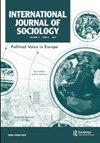State-Terror and Tolerance of Deviance: A Cross-National Analysis Using World Values Survey Data
IF 1.8
Q2 SOCIOLOGY
引用次数: 0
Abstract
AbstractThis study intends to extend the work of ecological predictors of tolerance of deviance to state terror. Utilizing a multilevel model and a cross-national survey of 125,129 respondents from 72 countries, this study finds that state terror and a worse perception of human rights correlates with a lower tolerance of deviance in line with Rational Choice Deterrence Theory (RCDC). The effect of state terror on tolerance of deviance is moderated by perception of human rights with those perceiving a worse respect for human rights in milieus of higher state terror are less open to deviance in line with RCDC. Further support for RCDC comes from those living in over policed neighborhoods being less open to deviance when they perceive a worse respect for human right. However, lower confidence in security services and greater interference by the same predicts greater tolerance of deviance. Support for Weberian legitimacy also comes from higher country level corruption, more terrorism incidents in a country, greater fear of crime and crime victimization of respondent or immediate family predicting greater justifiability of deviance.Keywords: Human rightscross-national researchquantitative methodssocial psychology of deviancemultilevel models AcknowledgementsThe author thanks the editor, the anonymous reviewers, the anonymous reviewers from an earlier version of the manuscript for their valuable feedback. The author thanks Ms. Merit Goddard Martens for her help.Disclosure statementNo potential conflict of interest was reported by the author(s).Data availability statementData sharing is not applicable to this article as no new data were created or analyzed in this study.Notes1 https://www.un.org/en/about-us/universal-declaration-of-human-rights2 https://sdg.humanrights.dk/en/instrument/signees/243 The question about stealing property being justified is asked in the waves used in this study and not in the WVS wave that Jang et al. (Citation2010) utilized.4 Taiwan’s HDI is from Taiwan’s National Statistical Office (full cite in references; National Statistics Republic of China (Taiwan) Citation2023) and Not UNDP.国家恐怖与越轨容忍:基于世界价值观调查数据的跨国分析
摘要本研究旨在将对越轨容忍的生态预测扩展到国家恐怖。利用多层次模型和对来自72个国家的125,129名受访者的跨国调查,本研究发现,根据理性选择威慑理论(RCDC),国家恐怖和较差的人权观念与较低的越轨容忍度相关。国家恐怖对越轨行为容忍度的影响受到人权观念的影响,在国家恐怖程度较高的环境中,那些认为对人权的尊重较差的人对越轨行为的接受程度较低,与RCDC一致。对RCDC的进一步支持来自那些生活在警察管制过度的社区的人,当他们认为对人权的尊重更差时,他们对越轨行为的态度就不那么开放。然而,对安全服务的信心越低,受到的干扰越大,就意味着对偏差的容忍度越高。对韦伯合法性的支持也来自于更高的国家层面的腐败,一个国家更多的恐怖主义事件,更大的对犯罪和犯罪受害的恐惧,被告或直系亲属预示着更大的越轨行为的正当性。关键词:人权跨国研究定量方法越轨社会心理学多层次模型鸣谢作者感谢编辑、匿名审稿人、初稿匿名审稿人提供的宝贵意见。作者感谢Merit Goddard Martens女士的帮助。披露声明作者未报告潜在的利益冲突。数据可用性声明数据共享不适用于本文,因为本研究没有创建或分析新的数据。注1 https://www.un.org/en/about-us/universal-declaration-of-human-rights2 https://sdg.humanrights.dk/en/instrument/signees/243关于盗窃财产是否正当的问题是在本研究中使用的波中提出的,而不是在Jang等人(Citation2010)使用的WVS波中提出的台湾的人类发展指数来自台湾国家统计局(完整引用于参考文献;中华民国(台湾)国家统计局(Citation2023),而不是联合国开发计划署。
本文章由计算机程序翻译,如有差异,请以英文原文为准。
求助全文
约1分钟内获得全文
求助全文

 求助内容:
求助内容: 应助结果提醒方式:
应助结果提醒方式:


